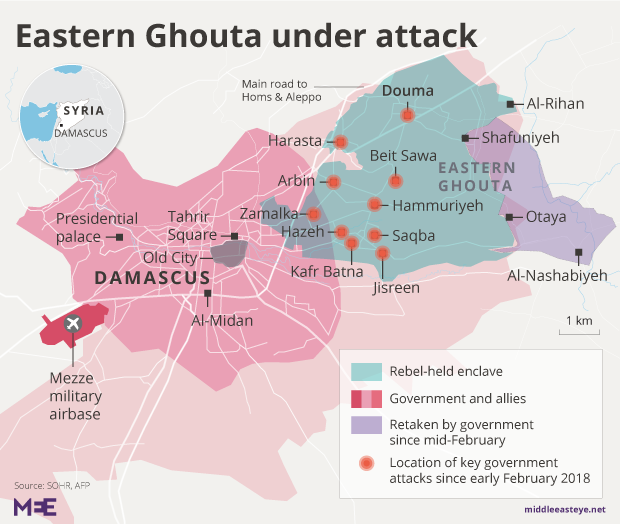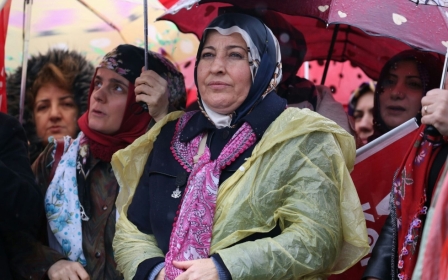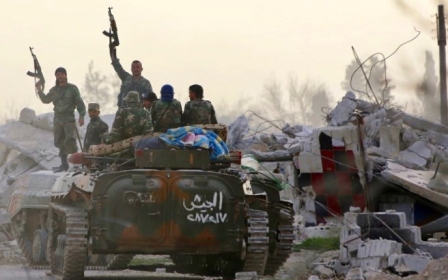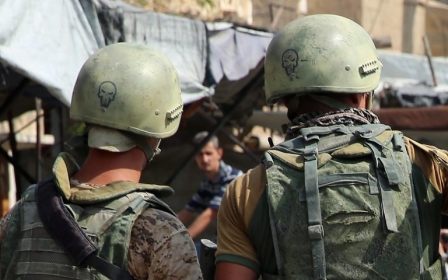Russia and US coalition have killed masses of Syrian civilians, UN says
Russian and US-led air attacks killed civilians in Syria on a large scale last year, while the Assad government carried out unlawful chemical weapon attacks in rebel-held Eastern Ghouta, UN war crimes investigators said on Tuesday.
Islamic State fighters and other rebel groups committed war crimes including deadly attacks on civilians and using them as human shields, the investigators said in their latest report covering six months to 15 January.
During the period, "victims of the Syrian conflict have suffered greatly as violence countrywide re-escalated to new heights", the UN Commission of Inquiry said.
"Government forces continued to use chemical weapons against armed group fighters in Eastern Ghouta," it said in its report.
Among other key findings, it said that unguided weapons launched by a "Russian fixed-wing aircraft" last November killed at least 84 people at a market in Atareb, west of Aleppo, in a "de-escalation zone" declared by Russia, Iran and Turkey.
It found no evidence that the Russian strike had deliberately targeted the market.
However, the inquiry stated the bombing "may amount to the war crime of launching indiscriminate attacks resulting in death and injury to civilians", the first time it has explicitly implicated Moscow in possible war crimes.
US bombing killed 150
And three US-led coalition strikes on a school in al-Badiya, Raqqa, in March 2017 killed 150 residents - roughly five times the toll acknowledged by the Pentagon, which said at the time that dozens of militants and not civilians were killed.
The UN investigators found no evidence that Islamic State fighters were at the site, and said the US-led coalition had violated international law by failing in its duty to protect civilians."Information gathered by the commission does not support the claim that 30 IS fighters were in the school at the time of the strike, nor that the school was otherwise being used by IS," it said.
Vital civilian infrastructure has been decimated by repeated attacks on medical facilities, schools and markets
- UN commission of inquiry
"The international coalition should have known the nature of the target and failed to take all feasible precautions to avoid or minimise incidental loss of civilian life, injury to civilians and damage to civilian objects, in violation of international humanitarian law."
Syrian government forces used chemical weapons against rebels in Eastern Ghouta, including chlorine three times in July, and in Harasta on the western edge of the zone in November, the report said.
"The use of chemical weapons is prohibited under customary international humanitarian law regardless of the presence of a valid military target, including when used against enemy fighters," it said.
The Syrian government has denied using chemical weapons, saying it surrendered its stockpiles after signing the global ban in 2013.
The report was based on 500 confidential interviews conducted with victims and witnesses abroad or in Syria via social media. The Assad government has never let the team into the country.
"Vital civilian infrastructure has been decimated by repeated attacks on medical facilities, schools and markets," it said.
"Humanitarian aid has been instrumentalised as a weapon of war with siege warfare and denial of life-giving assistance used to compel civilian communities and parties to the conflict alike to surrender or starve."
New MEE newsletter: Jerusalem Dispatch
Sign up to get the latest insights and analysis on Israel-Palestine, alongside Turkey Unpacked and other MEE newsletters
Middle East Eye delivers independent and unrivalled coverage and analysis of the Middle East, North Africa and beyond. To learn more about republishing this content and the associated fees, please fill out this form. More about MEE can be found here.






